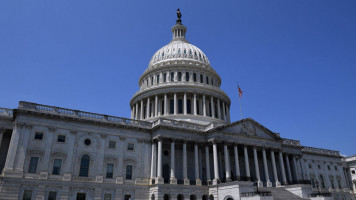Netanyahu: "Normalisation" with Arab states can lead to peace
Netanyahu: "Normalisation" with Arab states can lead to peace
Netanyahu said he sees the path to peace with Palestinians through Israeli ties with Arab states.
2 min read
Israel has peace treaties with just two Arab countries (AFP)
Israel's prime minister says he sees a path to peace with Palestinians through the "normalisation" of relations with Arab states which, like his country, are also facing an emboldened Iran.
"Many Arab countries now see Israel not as their enemy but as their indispensable ally in pushing back Iranian aggression," Prime Minister Benjamin Netanyahu said in an interview with Lithuania's LRT public broadcaster which aired on Monday.
"This has created normalisation which can lead to peace. I believe that if we have peace with the broader Arab world, it will help us get to peace with the Palestinians," he added in the interview taped during his visit to the Baltic state - the first-ever by an Israeli premier - that ended on Sunday.
Israel has peace treaties with just two Arab countries, Egypt and Jordan, while others insist on an agreement with the Palestinians as a prerequisite that would pave the way to formal relations.
Earlier this year Saudi Arabian King Salman reaffirmed "steadfast" support for the Palestinian cause after Crown Prince Mohammed bin Salman signalled a shift in the country's approach.
Prince Mohammed in April said in a magazine interview that Israelis, as well as Palestinians, "have the right to have their own land".
Both Israel and Saudi Arabia have opposed the Iran nuclear deal and pushed for tougher action against Iran's spreading influence in the Middle East.
In July, the Saudis slammed a controversial Israeli law as "perpetuating racial discrimination" against Palestinians by defining the country as the nation-state of the Jewish people.
Arab citizens account for some 17.5 percent of Israel's more than eight million population and have long complained of discrimination.
The Israeli legislation was also condemned by the six-nation Gulf Cooperation Council, comprised of Saudi Arabia, Bahrain, Kuwait, Oman, Qatar and the United Arab Emirates.
At least 171 Palestinians have been killed by Israeli fire during demonstrations near the border with Israel that began in March amid a humanitarian crisis in the Gaza Strip.
"Many Arab countries now see Israel not as their enemy but as their indispensable ally in pushing back Iranian aggression," Prime Minister Benjamin Netanyahu said in an interview with Lithuania's LRT public broadcaster which aired on Monday.
"This has created normalisation which can lead to peace. I believe that if we have peace with the broader Arab world, it will help us get to peace with the Palestinians," he added in the interview taped during his visit to the Baltic state - the first-ever by an Israeli premier - that ended on Sunday.
Israel has peace treaties with just two Arab countries, Egypt and Jordan, while others insist on an agreement with the Palestinians as a prerequisite that would pave the way to formal relations.
Earlier this year Saudi Arabian King Salman reaffirmed "steadfast" support for the Palestinian cause after Crown Prince Mohammed bin Salman signalled a shift in the country's approach.
Prince Mohammed in April said in a magazine interview that Israelis, as well as Palestinians, "have the right to have their own land".
Both Israel and Saudi Arabia have opposed the Iran nuclear deal and pushed for tougher action against Iran's spreading influence in the Middle East.
In July, the Saudis slammed a controversial Israeli law as "perpetuating racial discrimination" against Palestinians by defining the country as the nation-state of the Jewish people.
Arab citizens account for some 17.5 percent of Israel's more than eight million population and have long complained of discrimination.
The Israeli legislation was also condemned by the six-nation Gulf Cooperation Council, comprised of Saudi Arabia, Bahrain, Kuwait, Oman, Qatar and the United Arab Emirates.
At least 171 Palestinians have been killed by Israeli fire during demonstrations near the border with Israel that began in March amid a humanitarian crisis in the Gaza Strip.

![Palestinians mourned the victims of an Israeli strike on Deir al-Balah [Getty]](/sites/default/files/styles/image_684x385/public/2024-11/GettyImages-2182362043.jpg?h=199d8c1f&itok=xSHZFbmc)


![The law could be enforced against teachers without prior notice [Getty]](/sites/default/files/styles/image_684x385/public/2178740715.jpeg?h=a5f2f23a&itok=hnqrCS4x)
 Follow the Middle East's top stories in English at The New Arab on Google News
Follow the Middle East's top stories in English at The New Arab on Google News


